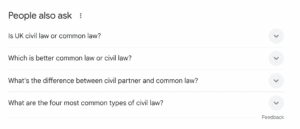Identifying which keywords to include on your website service pages, blogs, social media content, and PPC ads can be tricky to navigate, especially in such a competitive industry like the legal sector.
A service where clients can be at their most vulnerable, and have to put their full trust into the hands of professionals, means that the law industry relies heavily on recommendations from family and friends for referrals. However there are thousands of online searches for these kinds of services every month, which is why portraying reliability, trustworthyness, and expert knowledge through content on your website, is key for getting potential clients noticing and enquiring about your services online. Google also has to recognise your services as trustworthy, in order to rank you highly on the SERPs. This is where SEO and keyword research come in…
Using Ahrefs, we have identified the top 120 ranking keywords in the Law sector, for informational, transactional and commercial intent. Not only have we broken down the top ranking keywords into different legal services, but included some ideas for how to create useful content around them based on user intent.
While this list is very top-level, an SEO agency like ours could delve deeper into keyword research more specific to your services, targeting niche Google searches and optimising for certain keywords.
Want to know more about how we help businesses in the legal sector stay visible online? Get in touch with us today, or read more about our Dental Law case study
Why is keyword research useful?
As you will see with the keywords below, there can be many different ways of searching for the same thing.
Users looking for a first-hand understanding of civil law could search for:
- ‘What is civil law?’
- ‘Civil law meaning’
- ‘Definition of civil law’
- ‘What does civil law mean?’
And most of the time, all of these searches will give different outputs and websites for the user to browse through.
Your website content might be extremely useful, clear, and helpful for a user, but if it is not matched to what a user is typing into the Google search bar, it isnt going to get found.
Carrying out keyword research gives an insight into how your audience are searching for your services online, what their intent is, and allows you to optimise your content to make it more visible in the SERPs.
How to understand the following keywords
What is keyword difficulty?
This is an estimate of how competitive it is to try and rank for this specific keyword against other websites and competitors.
What is search volume?
The search volume indicates on average, how many users have searched for a phrase over the past month. The results below are UK-specific.
Employment Law
| Keyword | Keyword Difficulty | Search Volume |
| employment law | 71 | 7800 |
| employment law uk | 64 | 1800 |
| employment law solicitors | 12 | 1400 |
| free employment law advice | 26 | 1300 |
| employment law advice | 55 | 1200 |
| uk employment law | 64 | 1000 |
| employment law solicitors near me | 3 | 1000 |
| employment law changes 2024 | 2 | 900 |
| solicitors for employment law | 20 | 700 |
| free online employment law advice for employees uk | 52 | 600 |
| employment law scotland | 3 | 450 |
| what is employment law | 20 | 450 |
| employment law courses | 12 | 450 |
| employment law attorney | 16 | 400 |
| employment law lawyers | 22 | 400 |
| employment law changes | 4 | 350 |
| no win no fee solicitors employment law | 3 | 350 |
| employment law updates | 4 | 300 |
| employment law firms | 16 | 300 |
| employment law glasgow | 6 | 250 |
Family law
| Keyword | Keyword Difficulty | Search Volume |
| family law solicitors | 64 | 3400 |
| family law | 54 | 3300 |
| family law attorney | 27 | 2100 |
| family law solicitors near me | 41 | 1900 |
| family law act 1996 | 6 | 1200 |
| family law solicitor | 36 | 1100 |
| family law lawyer | 33 | 800 |
| family law near me | 63 | 600 |
| family law advice | 65 | 600 |
| free family law advice | 50 | 600 |
| family law attorney near me | 61 | 500 |
| family law solicitors birmingham | 2 | 500 |
| family law solicitors london | 22 | 500 |
| free 24 hour family law advice uk | 21 | 500 |
| family law act | 6 | 450 |
| family law solicitors manchester | 8 | 400 |
| legal aid family law | 49 | 400 |
| family law attorneys | 31 | 350 |
| family law firm | 46 | 350 |
| family law week | 0 | 350 |
Commercial law
| Keyword | Keyword Difficulty | Search Volume |
| commercial law | 17 | 2900 |
| what is commercial law | 6 | 1100 |
| commercial law firms | 4 | 700 |
| why commercial law | 3 | 300 |
| commercial law solicitors | 10 | 250 |
| commercial property law | 0 | 250 |
| commercial law firm | 33 | 200 |
| international commercial law | 42 | 150 |
| commercial awareness law | 1 | 150 |
| commercial law meaning | 11 | 150 |
| commercial law firms london | 7 | 150 |
| commercial law news | 22 | 100 |
| commercial contract law | 2 | 100 |
| commercial law jobs | 0 | 100 |
| difference between corporate and commercial law | 1 | 100 |
| commercial and corporate law | 2 | 100 |
| corporate and commercial law | 2 | 100 |
| commercial law solicitor | 12 | 100 |
| difference between commercial and corporate law | 1 | 90 |
| commercial property law firms | 4 | 90 |
Criminal law
| Keyword | Keyword Difficulty | Search Volume |
| criminal law | 39 | 2500 |
| section 3 criminal law act | 0 | 1300 |
| criminal law solicitors | 11 | 600 |
| what is criminal law | 39 | 500 |
| difference between civil and criminal law | 3 | 400 |
| criminal law act 1977 | 0 | 300 |
| criminal law solicitors near me | 7 | 250 |
| criminal law firms london | 21 | 200 |
| criminal law uk | 15 | 200 |
| criminal law jobs | 4 | 200 |
| civil vs criminal law | 2 | 150 |
| criminal law lawyer | 9 | 150 |
| criminal law solicitor | 16 | 150 |
| idpc criminal law | 0 | 150 |
| criminal law firm | 21 | 150 |
| difference between criminal and civil law | 3 | 150 |
| criminal law solicitors london | 29 | 150 |
| civil law vs criminal law | 3 | 150 |
| criminal law definition | 38 | 150 |
| criminal law examples | 47 | 150 |
Civil law
| Keyword | Keyword Difficulty | Search Volume |
| civil law | 69 | 1900 |
| what is civil law | 54 | 600 |
| difference between civil and criminal law | 3 | 400 |
| civil law solicitors | 3 | 250 |
| civil partnership vs common law | 5 | 200 |
| civil law definition | 41 | 200 |
| civil vs criminal law | 2 | 150 |
| civil law examples | 26 | 150 |
| difference between criminal and civil law | 3 | 150 |
| civil law vs criminal law | 3 | 150 |
| civil law meaning | 33 | 150 |
| common law vs civil law | 30 | 150 |
| civil law solicitors near me | 50 | 150 |
| what is civil law uk | 10 | 100 |
| criminal vs civil law | 4 | 100 |
| what is the difference between civil and criminal law | 4 | 100 |
| civil law uk | 46 | 100 |
| examples of civil law | 33 | 100 |
| what is the purpose of civil law | 51 | 100 |
| purpose of civil law | 46 | 100 |
Personal Injury
| Keyword | Keyword Difficulty | Search Volume |
| personal injury lawyer near me | 49 | 3000 |
| personal injury lawyer | 46 | 2700 |
| personal injury attorneys | 47 | 2700 |
| personal injury solicitors | 46 | 2300 |
| personal injury claims | 23 | 2000 |
| personal injury attorney | 45 | 2000 |
| best personal injury lawyer | 31 | 1600 |
| personal injury lawyers | 46 | 1600 |
| personal injury claim | 48 | 1200 |
| personal injury | 46 | 1000 |
| personal injury law firm | 30 | 900 |
| attorney personal injury lawyer | 46 | 700 |
| personal injury trust | 0 | 700 |
| personal injury insurance | 3 | 600 |
| solicitors personal injury | 39 | 600 |
| lawyer for personal injury | 39 | 600 |
| personal injury attorneys near me | 65 | 500 |
| top rated personal injury lawyer | 4 | 500 |
| personal injury law | 31 | 500 |
| personal injury claims new rules | 9 | 450 |
How to use these keywords in your content
Informational content

A huge proportion of these keywords are based around the user wanting informative content. The legal industry can be a confusing one, so many people tend to start their searches with question-based phrases. Breaking down complex legal topics can be extremely valuable to someone who is overwhelmed by the industry jargon.
Some of the answers might just be simple definitions and explainer topics, for example, ‘Civil law meaning’. Here you can keep things short and simple, explaining content in use cases, or condensing commonly searched for keywords into a glossary.
Creating new pages and posts for such short content in most cases isn’t helpful towards your SEO, so it’s always best to naturally include short snippets with keyword-rich headings as a part of your longer content.
For searches which might need a bit more context or explanation, running a frequent blog on your website can be a great way to include relevant keywords in topics. Blogs help to showcase your expertise, demonstrate authority and present as an industry leader. You could explain legal processes with analogies or real world examples to help make the content more accessible and to keep your reader engaged
Using one of the keywords above, you could create comparison blogs titled: ‘What is the difference between civil law and criminal law?’
Informational content can also be naturally included on your main service pages in FAQ sections. This also gives you a higher chance of appearing in the People Also Ask section on the SERP itself.

Other types of informational blog content could be broken down into ‘how to’ blogs, step-by-step guides and top tips for individuals researching their legal options.
Informational content doesn’t have to stop with blogs, though. Downloadable guides and whitepapers can offer a more in-depth informational experience for those looking for a more detailed answer.
Add trust signals
Many of the above keywords include ‘top-rated’ or ‘best’. These searches imply that the user is looking for a top-quality service, and is in the stage where they are likely to compare options and reach out to law firms.
There are many factors that could influence what a search user thinks is a top-quality service. You could include reviews and client testimonials to let potential clients see what people who have been in their shoes think of your services. A report by Clio highlighted that 81% of people read client testimonials before deciding to hire a lawyer.
Industry awards and recognitions are also great trust signals to include on your website. Presenting yourself as an industry leader could put you a steep ahead of a competitor.
Case studies are also powerful features to include on your website. While legal case studies can be difficult to get signed off, anonymous case studies can still have a bigger impact than you might think.
Don’t overcomplicate your content
Like with any industry, there are certain terms and keywords that can be that will only be clear for those who are familiar with that industry.
While you may want to express your knowledge in certain areas, it is always important to not include too much jargon, and to explain in simple terms in cases where jargon is needed.
Complexity is good for legal cases, however, it’s not useful for people looking for help with legal services.
Optimise for local searches

In the legal sector, it is important that your content is well optimised for local searches. People who need legal advice and legal services are looking for businesses which are in close proximity for convenience.
This is why it is so common to see phrases like ‘near me’, ‘close to me’, ‘local’ or ‘around me’. It could also be useful to have a dedicated page for your location, and you could optimise for phrases like ‘best law firm in Manchester’, or ‘employment law firm in Bristol’
While not specifically website content, you need to make sure that your Google My Business profile is optimised. User search is changing and there are an increasing number of people using Google and Apple maps for their local searches.
Identify your USPs
There is also a pattern in the keywords above of searching for services which are ‘free’ or ‘no win no fee’.
Before users even land on a website, they know that using legal services can be an expensive journey. Despite people looking for quality, they also are looking for the best value for money.
If you offer a free consultation call, free quotes or affordable prices in your area, then make this well-known in your content.
With such individual cases, you might also think that displaying estimated prices on your website could turn people away or create false expectations. However, including estimation fees can be really useful for someone in the middle of their decision making, and transparency can go a long was,y especially in an industry where trust is key.
Be personal
A key part of any keyword research in law, is understanding that behind every search there is a real person, who cares about the outcome, cost, legal journey and processes that they might have to go through along the way.
Many of the keywords above include the word ‘solicitor’ or ‘lawyer’ or ‘attorney’, showing that often search users have an understanding they will be working directly with an individual.
Whether you are an independent lawyer, a family-run law firm, or has a chain of branches across the country, there needs to be an element of trust between the parties involved.
You can create this by including bios of the lawyers/solicitors/attorneys on your website. Include qualifications, qualities, previous experience etc. and use images to put a face behind the name.
Optimising your content
Matching the top keywords to the right user intent can be extremely valuable for the user when they land on your page. However we need to make sure that they are likely to land on your page. This is why your content needs to be optimised for not just the user, but Google too.
Our site is full of useful blogs with tips to improve your website content. Find some below:
- 9 reasons your content isn’t ranking
- Tips for using open ended and closed questions in website content
- How to identify and fix thin content
- Content ideation tips for your website
While this blog was heavily focused on written content to include the keywords within, also be mindful that content can exist in other formats like images, videos, infographics, animations, and graphs
If you are interested in how we do keyword research and content creation for our clients here at Embryo, get in touch today.













